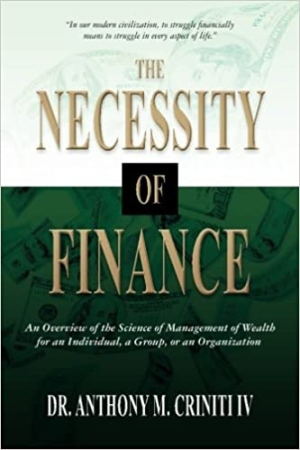The Necessity of Finance
An Overview of the Science of Management of Wealth for an Individual, a Group, or an Organization
The Necessity of Finance is a compelling proposal for granting the study of finance proper consideration for its important role in wealth maximization.
The Necessity of Finance is a compelling treatise on the nature of finance and its proper role in education, government, and society.
Anthony M. Criniti IV believes that the field of finance has not received its share of the praise, or attention, given to the field of economics. In modern American higher education, he argues, finance is the poor cousin of economics. To remedy this disparity, his book argues that universities should elevate finance on par with economics, understanding that it is essential to individuals, families, groups, organizations, and nations.
The book argues that ignoring the centrality of finance by attributing too much importance to economics could harm society, and that economists and “financialists” should “do some soul searching” and work together to produce ethical financial products. Its proposed solution is to differentiate finance from economics so that finance receives “full credit” for its functions.
The book performs dual duty as both proposal and primer. First, it proposes a radical restructuring of the current higher education hierarchy that’s used to teach finance-related social sciences. It suggests demoting finance-related topics like business, marketing, human resources, and accounting to subsciences of finance, reasoning that their ultimate goal is wealth maximization, or a function of finance. Credible arguments for this curriculum change arise, particularly because of the book’s insider perspective and its discussions of the two fields, which make it clear that they are not the same. The premise that finance as a field of study has received short shrift from academics is not well supported, though, and builds upon opinions, rather than on shared research.
As a primer, the book contains an impressive amount of information about finance and economics, including clear definitions of its terms and concepts. Enough detail is provided to cover the topics without bogging the text down in minutiae. Concepts including money and wealth, risk and return, and the division of labor are explained with compelling examples and clear language. Thorough explanations of complex economic concepts help to make the study of finance less intimidating and more accessible. Even the book’s discussions involving mind-bending math are presented with clarity and humor.
The book is organized into short chapters that cover the nature of the two fields in concise yet comprehensive detail. Its work follows a logical flow, from a current overview to historical underpinnings, and then back to modern uses and implications. Its clean book design enhances its readability.
As a reference on finance and economics, this book has the makings of a classic, while its coining of the term “financialist” indicates a hopeful desire for change. The professorial tone is sometimes overbearing, though, and the mild undercurrent of resentment is palpable, implying that finance professors’ accolades are long overdue.
The Necessity of Finance is a compelling proposal for granting the study of finance proper consideration for its important role in wealth maximization.
Reviewed by
Carol Booton
Disclosure: This article is not an endorsement, but a review. The publisher of this book provided free copies of the book and paid a small fee to have their book reviewed by a professional reviewer. Foreword Reviews and Clarion Reviews make no guarantee that the publisher will receive a positive review. Foreword Magazine, Inc. is disclosing this in accordance with the Federal Trade Commission’s 16 CFR, Part 255.

